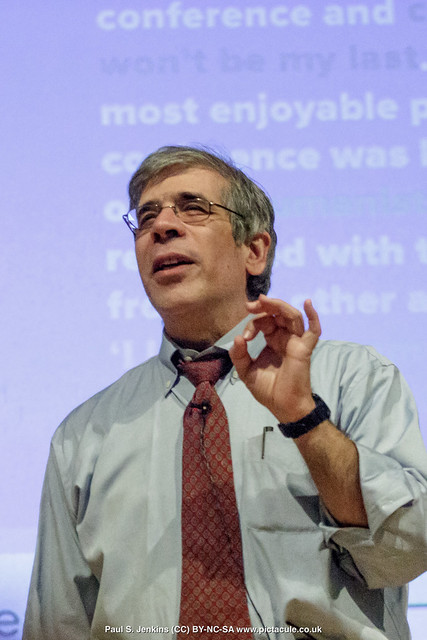
The BHA's video of the event can be found here:
https://youtu.be/sazo1J4Zsj4

OK I watched it, and some parts were indeed disastrous — kind of like Big Brother Goes On The Road. They started in Las Vegas, for no other reason (that I could discern) than it allowed for some clichéd photo-opportunities.
Jerry Coyne doesn't suffer fools, and his debunking of Noah's Ark did not go down well with the creationists. The creationist who appeared to have appointed himself "star-of-the-show" also seemed to be entertaining the idea that the show itself was a conspiracy, and he was impervious to reason, maintaining that the purpose of science was to deny God.
The presenter, Andrew Maxwell, nailed it with his bemused announcement that he couldn't understand how, in the face of so much evidence for evolution, the creationists simply dismissed anything that was contrary to scripture. He asked one of them why they even bother to look at the science if they're not going to accept anything that doesn't agree with what they already believe.
A frustrating programme that generated — on my part — more than its fair share of sighing and head-shaking.
There are more things in heaven and earth, Horatio,
Than are dreamt of in your philosophy.
| Sir Martin Rees |
 Within what might loosely be called the sceptical community there is a faction holding that scepticism should be confined to matters of "woo-woo" – in general such things as alternative medicine, astrology, lay-lines, dowsing, claims of psychic ability, spiritual mediumship, alien abduction and so forth, and should not be concerned with religion. Daniel Loxton, editor of Junior Skeptic, in his 2007 essay "Where Do We Go From Here?" – an impassioned rallying cry to sceptical endeavour – suggested that the atheism/theism debate was diverting scepticism from its true concerns, and urged a return to those concerns. (Incidentally you can hear him deliver the essay in episode 63 of the Skepticality podcast. Note also that there is now a follow-up publication, "What Do I Do Next?")
Within what might loosely be called the sceptical community there is a faction holding that scepticism should be confined to matters of "woo-woo" – in general such things as alternative medicine, astrology, lay-lines, dowsing, claims of psychic ability, spiritual mediumship, alien abduction and so forth, and should not be concerned with religion. Daniel Loxton, editor of Junior Skeptic, in his 2007 essay "Where Do We Go From Here?" – an impassioned rallying cry to sceptical endeavour – suggested that the atheism/theism debate was diverting scepticism from its true concerns, and urged a return to those concerns. (Incidentally you can hear him deliver the essay in episode 63 of the Skepticality podcast. Note also that there is now a follow-up publication, "What Do I Do Next?") To me, this partitioning of religious scrutiny has a flavour of Stephen Jay Gould's non-overlapping magisteria (NOMA), an idea suggesting that science and religion are separate disciplines addressing different things: science being concerned with the material, physical realities of the universe, and religion with the spiritual, moral aspects of human life. I find this to be a false distinction, and it can be seen as such by looking at religious claims (and their tacit assumptions). For example the Catholic Church recently complained that Reiki, a form of "energy healing", isn't backed up by scientific evidence. It's hard to believe that those Catholics behind this statement don't see the huge irony of what they are saying.
To me, this partitioning of religious scrutiny has a flavour of Stephen Jay Gould's non-overlapping magisteria (NOMA), an idea suggesting that science and religion are separate disciplines addressing different things: science being concerned with the material, physical realities of the universe, and religion with the spiritual, moral aspects of human life. I find this to be a false distinction, and it can be seen as such by looking at religious claims (and their tacit assumptions). For example the Catholic Church recently complained that Reiki, a form of "energy healing", isn't backed up by scientific evidence. It's hard to believe that those Catholics behind this statement don't see the huge irony of what they are saying. Jerry Coyne fueled the debate recently with a blog-post entitled "Truckling to the Faithful: A Spoonful of Jesus Helps Darwin Go Down" in which he took issue with the US National Academy of Science and the National Center for Science Education's "accommodationist" stance regarding the compatibility of science and religion.
Jerry Coyne fueled the debate recently with a blog-post entitled "Truckling to the Faithful: A Spoonful of Jesus Helps Darwin Go Down" in which he took issue with the US National Academy of Science and the National Center for Science Education's "accommodationist" stance regarding the compatibility of science and religion.